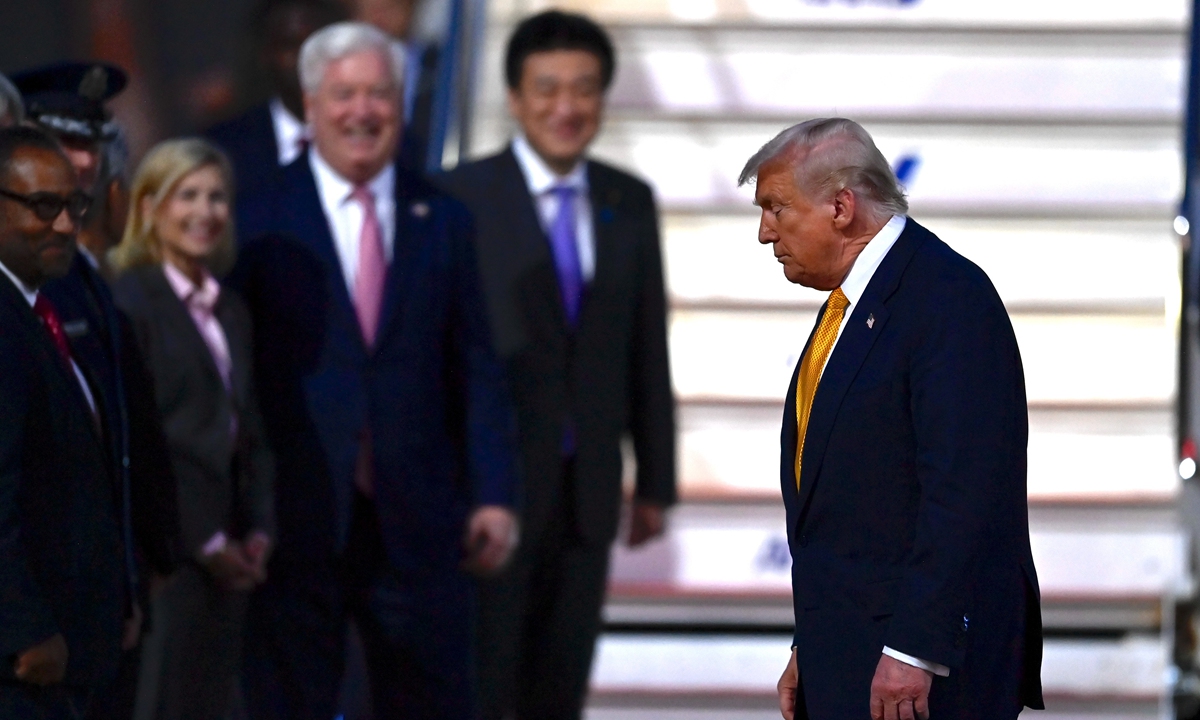New Japanese Prime Minister Sanae Takaichi will face what some Japanese media outlets call “a big test” on diplomacy as US President Donald Trump arrived on Monday for his first visit to the country in six years.
Although the Takaichi administration was finalizing a procurement package—including US pickup trucks, soybeans, and liquefied natural gas—for upcoming trade and security talks with Trump in Tokyo on Tuesday, media widely suggest that this diplomatic engagement remains fraught with uncertainty, citing factors including Takaichi’s inauguration just last week, her fragile political support base, and multiple potential areas of policy divergence.
Trump is scheduled to hold his first face-to-face talks with Takaichi the following day, with Takaichi expected to confront multiple contentious issues including increasing Japanese defense spending, implementation of the agreed $550 billion investment in the US, and burden-sharing within the bilateral alliance, according to Japanese media reports.
The two leaders are also arranged to visit the US Navy’s Yokosuka Base in Kanagawa Prefecture and board the nuclear-powered aircraft carrier USS George Washington to showcase the “robust US-Japan alliance”, Kyodo News reported.
The Asahi Shimbun reported that Trump left Malaysia on Monday morning for his first visit to Japan since starting his second term. He met the Japanese Emperor Naruhito on Monday evening, to be followed by Sanae on Tuesday.
Upon Trump’s arrival, Takaichi welcomed the US president on X, saying “looking forward to seeing you tomorrow and having a fruitful discussion on how we can further strengthen our great Alliance,” Takaichi added on X.
However, multiple Japanese media outlets have expressed concerns over the upcoming US-Japan summit.
Mainichi Shimbun commented Monday, “Having observed how leaders from other countries have previously been maneuvered by Trump during negotiations, the [Japanese] prime minister faces an early test of her diplomatic skills just one week after taking office.”
“Could this [US president’s Japan trip] actually backfire on Japan?” Japanese local media outlet CBC Magazine questioned, noting that as the purpose of the US president’s visit is presumably to negotiate and present various conditions to Japan, his past behavior gives us “reasons for concern.” Citing a Japanese analyst, the media outlet said the real challenge lies in “skillfully managing the conversation, keeping him pleased, and extracting the most advantageous conditions possible for Japan.”
TBS News reported Monday that beyond rare earths, Japan and the US face numerous economic challenges, questioning whether common ground can be found. The news outlet said that the upcoming summit is expected to deeply affect Japanese public livelihood and to feature the signing of a memorandum covering 80 trillion yen ($550 billion) of investments in the US to address US tariffs and shipbuilding cooperation.
“I look forward to meeting the new prime minister,” Trump told reporters aboard Air Force One en route to Japan from Malaysia, Jiji Press reported.
On Saturday, Takaichi held her first phone call with Trump, with the new Japanese leader saying that strengthening the two countries’ alliance is “a top priority” ahead of their summit talks, Japan Times reported Sunday.
Takaichi is looking to have Japan reach a target of spending 2% of GDP on defense by the end of this fiscal year, effectively moving the planned hike ahead by two years, as Tokyo looks to spotlight its commitment to shouldering more of the defense burden ahead of the US president’s visit, the report noted.
A Chinese expert notes that while defense will top the agenda, trade could prove equally thorny during their potential talks.
For Japan, raising defense spending above 2% of GDP and adopting an ‘investment-for-tariffs’ compromise carries risks, Xiang Haoyu, a distinguished research fellow at the Department for Asia-Pacific Studies of the China Institute of International Studies, told the Global Times on Monday.
“The risks are twofold: domestically, Japan’s diplomatic autonomy may further erode as it becomes increasingly entangled in major-power conflicts, while soaring defense costs will crowd out social welfare and economic development, exacerbating fiscal strains,” Xiang said.
“Regionally, Japan’s move toward military normalization will heighten the security concern of neighboring countries, potentially intensify an arms race in the region, and ultimately risk undermining the hard-won peace and stability,” Xiang warned.
How Takaichi, who vowed to “reclaim Japan’s diplomacy and let it flourish at the center of the world”, and US President, who champions “making America great again”, will face off, and what the outcome will be, is being scrutinized, according to analysts.




